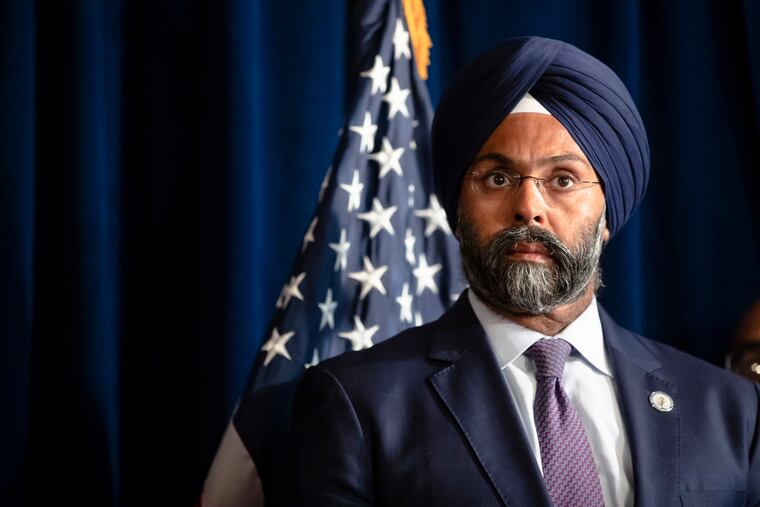New Jersey’s use-of-force reforms can guide police in Pa. and beyond | Editorial
New Jersey Attorney General Gurbir Grewal's groundbreaking policy reforms will prohibit state, county, and local police officers from using any sort of physical force except as a last resort.

Starting Jan. 1, 2022, state, county, and local police officers throughout New Jersey will be prohibited from using any form of physical force against a civilian except as a last resort. That’s the bottom line of the use-of-force reform effort that N.J. Attorney General Gurbir S. Grewal launched in 2018; he unveiled the new policies last week in Trenton.
The policies detail the duty of officers to de-escalate situations by verbal and other means; bolster the internal police as well as the public reporting requirements for incidents involving force; and require reviews of every use-of-force incident, not just those that spark a complaint. New Jersey law enforcement can still use deadly force, such as firearms or blows to the head, but only after officers have attempted to de-escalate matters, have offered the person opportunities to comply, and believe their own or another’s life, or physical safety, is in danger.
» READ MORE: N.J. unveils statewide police use-of-force policy that emphasizes de-escalation
New Jersey’s ambitious initiative is attracting national attention as a year marked by a reckoning about America’s systemic racism comes to a close. Much of the national conversation has focused on deadly encounters between police and Black people, which as of Dec. 20 totaled 220 fatalities. (Whites accounted for 426 deaths; 148 Hispanics were killed.) The dead included Breonna Taylor in Louisville, George Floyd in Minneapolis, Walter Wallace in Philadelphia; and Maurice Gordon in Burlington County, NJ.
» READ MORE: New Jersey AG releases recordings of state trooper’s fatal encounter with an unarmed black man in Burlington County
In addition to dramatically circumscribing the use of deadly or any physical force, New Jersey’s new policy would:
prohibit officers from firing weapons at a moving vehicle, or from engaging in a high-speed car chase, except in certain instances.
provide new guidance about using less-than-lethal force as a de-escalation tool, and in place of deadly force.
require officers to intercede if they observe another officer using excessive force against a civilian.
require officers to request — and, where appropriate, personally provide — medical assistance after any use of force against a civilian.
The reforms also lay out what is required of police who encounter a person who appears to be mentally ill, disabled, withdrawing from drugs, or in other ways impaired or compromised in their ability to comprehend an officer’s questions or commands. New Jersey also will launch what Grewal said will be a first-of-its-kind web portal officers will be required to use it to report every use-of-force incident. This system will enable the state and the public to view data and detect racial disparities in police use-of-force.
Although Grewal’s office is by statute more powerful than those of his counterparts in other states, including Pennsylvania, these reforms apply to urban, suburban, and rural police departments, as well as to state police. New Jersey’s reforms are drawing support from law enforcement officials as well as police unions, and it deserves a serious look by other jurisdictions, such as Philadelphia.
The Garden State’s groundbreaking effort offers an opportunity for the rest of the country to see substantive law enforcement reform at work. And it may help make policing less deadly — especially for Black Americans.
This editorial has been modified to remove an incorrect reference to an earlier town hall event.